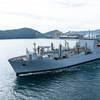British and Russian World War Two veterans gathered on Wednesday in Arkhangelsk, 75 years to the day since Britain's first Arctic convoy of military supplies steamed into the northern port.
Britain's Princess Anne has been among those attending events honouring those who sailed, and the thousands who died, protecting supply convoys dispatched to aid the Soviet Union against Nazi Germany.
On Aug. 31, 1941, two months after Hitler's surprise attack on his erstwhile ally prompted Josef Stalin to seek support from a beleaguered Britain, the first convoy, codenamed "Dervish", sailed into Arkhangelsk, or Archangel, after a 10-day crossing.
In one of the lesser known examples of British-Soviet wartime cooperation, the six British and one Dutch merchant ships which arrived under the protection of the Royal Navy carried among other supplies a force of Hurricane fighters.
These would be flown by Britain's Royal Air Force in aerial battles with the Luftwaffe and the Germans' Finnish allies before being handed over to Soviet pilots.
John "Tim" Elkington, who arrived as a 20-year-old with the RAF's 151 Wing in Russia, said his most frightening experience was crossing the Arctic Sea on a route that would claim more than 3,000 Allied lives over the next four years as U-boats, aircraft and mines sank 101 merchant and naval ships.
"The most dangerous part was being on an Arctic convoy and not knowing what was going to happen with the submarines, the aircraft and the mines," Elkington said.
"But the operation in the air, there was no real danger because we were used to fighting Messerschmitts. We were used to that. And it was quite exciting to shoot an aircraft down."
ICY WATERS
The convoys were "the worst journey in the world" in the words of Prime Minister Winston Churchill, who used them to forge an uneasy anti-Nazi alliance with Stalin that would last until the victors fell out, ushering in the Cold War.
Concern in Moscow that a standoff with NATO over Ukraine is a "new Cold War" have been accompanied by increased interest from President Vladimir Putin's Kremlin in rekindling memories of World War Two cooperation with Britain and the United States.
As commemorations of Russians' wartime sacrifices reinforce national pride and loyalty to Putin at home, surviving foreign veterans have also been feted in recent years as Moscow seeks to counter what it sees as vilification in the West.
In a spirit of detente, Princess Anne said: "The scale of the loss felt by the Soviet Union during the Second World War was enormous and will not be forgotten by the United Kingdom."
Russians who worked on the wartime docks spoke of their pleasure at seeing again British sailors they had encountered.
British veterans, especially those like the RAF air and ground crews who spent months on shore working and fighting alongside the Red Army, recalled strong bonds of friendship being formed in a land where Communist society was as exotic and alien and the frozen Arctic seas and terrain they all endured.
(Writing by Alastair Macdonald; editing by Ralph Boulton)













